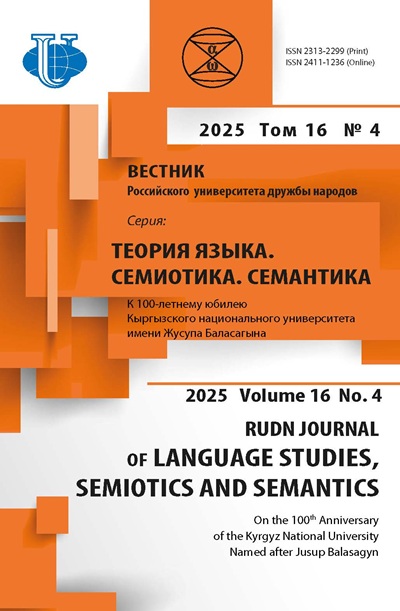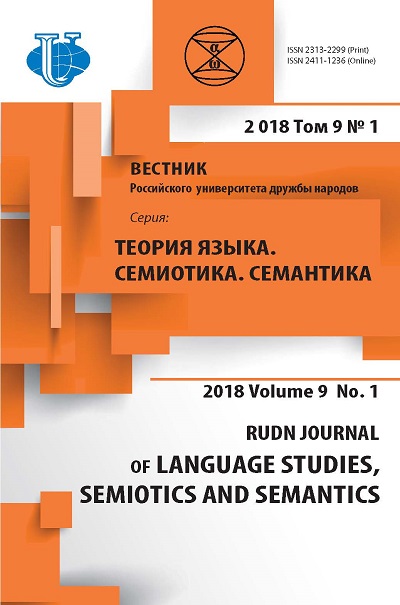Pragmalinguistics of Richard Nixon’s stylistic behavior (research into the president’s selected speeches)
- Authors: Mukhortov D.S.1
-
Affiliations:
- Lomonosov Moscow State University
- Issue: Vol 9, No 1 (2018)
- Pages: 77-92
- Section: POLITICAL LINGUISTICS
- URL: https://journals.rudn.ru/semiotics-semantics/article/view/18269
- DOI: https://doi.org/10.22363/2313-2299-2018-9-1-77-92
- ID: 18269
Cite item
Full Text
Abstract
The paper seeks to analyze pragmalinguistic features of the politician’s stylistic behavior by studying nominative and syncategorematic parts of speech in his discourses. The hypothesis is regardless extralinguistic factors in a communicative situation the stylistic behavior can be seen as the touchstone of the politician’s success. A deficient stylistic behavior is fraught with communicative flops. The paper discusses theoretical grounds of pragmasemantic analysis of the politician’s stylistic idiosyncrasies, suggests a classification of categories for pragmasemantic analysis, pinpoints a cluster approach to studying lexical and syntactic units, and provides new insights into semiotics of the status-bound type of language identity. This article drawing on Richard Nixon’s selected speeches, The Checkers Speech (1952), The Great Silent Majority Speech (1969), and The First Watergate Address (1973), specifies the concept of presidential language identity. A determining factor moulding the stylistic behavior of this kind of people is a stressful or semi-stressful situation. The method of research in the article is termed as ‘pragmasemantic analysis of the politician’s language identity’. It is yet to be elaborated in detail. The article attempts to define it as focusing on interrelated grammar categoties, like personal pronouns, verb tense, functional and auxiliary verbs, article, numerals, and prepositions, along with communication-bound categories of optimism/pessimism, diplomatic/bossy, president-like speech/unpresident-like speech, age, gender, vested interests group membership in order to find out the politician’s idiosyncrasies and communication strategies and tactics. The article argues that whatever strategies and tactics Nixon persued in his discourses, his stability in the domestic political arena was guaranteed only by truthful verbal behavior. The Watergate speeches failed him and he paid the price for it. The paper, hence, highlights the problem of studying truth/lie verbal markers which largely depend on the author of the text in question.
About the authors
Denis Sergeevich Mukhortov
Lomonosov Moscow State University
Author for correspondence.
Email: dennismoukhortov@mail.ru
Candidate of Philology, Associate Professor, Department of English Linguistics, School of Philology, Lomonosov Moscow State University. Research interests: hermeneutic study of political discourse, semantic analysis of hypertext, lexical-semantic and syntactic transformation in the translation of policy speeches
1/51, Leninskiye Gory, Moscow, Russia, 119234References
- Mukhortov, D.S. (а) (2014).’Yazykovaya lichnost’, ‘rechevoy portret’, ‘idiostil’, ‘idiolect’: the notions of Russian scholars in contrast. What is required to study the politician’s stylistic behaviour? Politicheskaya Kommunikatsiya: perspektivy razvitiya nauchnogo napravleniya: materialy mezhdunarodnoy nauchnoy konferentsii (Ekaterinburg, 26—28.08.2014) In Political Communication: Prospects of Development of the Scientific Sphere, 2014. pp. 167—173. (Russ).
- Mukhortov, D.S. (b) (2014). A Pragmasemantic research into nominative and syncategorematic parts of speech in public discourses of the head of state (a study of R. Raegan’s addresses), Political Linguistics, 4 (50), 157—172.
- Mukhortov, D.S. (2016). Featuring the lexical semantic structure of the English election discourse / Political Linguistics: problems, methods, aspects of research and prospects of the field of study: Proceedings of the International scientific conference in Ekaterinburg on September 26—30, 2016. Ekaterinburg: Ural State Pedagogical University. рр. 152—154.
- Mukhortov, D.S. (2017). On some features of the adversarial function in debates between US presidential contenders: research into the rhetoric of Marco Rubio, Ted Cruz, and Donald Trump, RUDN Journal of Language Studies, Semiotics and Semantics, 8(2), 350—357.
- Strelets, I.E. (2014). The influence of personal characteristics of political leaders in the exercise of the office of president of Russia [dissertation]. Moscow.
- Sheigal, E.I. (2000). Semiotics of political discourse [dissertation]. Volgograd.
- Bruschke, J. & Divine, L. (2017). Debunking Nixon’s Radio victory in the 1960 election: Re-analyzing the Historical Record and Considering Currently Unexamined Polling Data. The Social Science Journal, 54(1), 67—75.
- Bochin, H. (1990). Richard Nixon: rhetorical strategist. Greenwood Publishing Group.
- Chung, C.K. & Pennebaker, J.W. (2007). The psychological functions of function words in Fieldler (Ed.).In Social Communication. New York: Psychology Press. pp. 343—359.
- DeGroot, T., Aime, F., Johnson, S.G. & Kluemper, D. (2011). Does Talking the Talk Help Walking the Walk? An Examination of the Effect of Vocal Attractiveness in Leader Effectiveness. The Leadership Quarterly, 22(4), 680—689.
- Leuprecht, C.& Skillicorn, D.B. (2016). Incumbency Effects in U.S. Presidential Campaigns: Language Patterns Matter. Electoral Studies, 43, 95—103.
- Nixon R. (1969). The Great Silent Majority Speech. November 23. URL: http://www.americanrhetoric.com/speeches/richardnixongreatsilentmajority.html (accessed: 17.07.17).
- Nixon, R. (1952). Checkers Speech. September 23. URL: http://ww.emersonkent.com/ speeches/checkers.htm (accessed: 17.07.17).
- Pennebaker, J.W. (2011). The secret life of pronouns: what our words say about us. New York: Bloomsbury Publishing.
- Pennebaker, J.W. & King, L.A. (1999). Linguistic styles: language use as an individual difference. Journal of Personality and Social Psychology, 77(6), 1296—1312.
- Pennebaker, J.W., Persaud, R. The Third UK Debate: Assessing Optimism, Honesty, and Thinking Styles. URL: https://wordwatchers.wordpress.com/2010/04/29/the-third-uk-debate-assessing-optimism-honesty-and-thinking-styles/ (accessed: 17.07.2017).
- Nixon, R. (1973). Address to the Nation about the Watergate Investigations. April 30. URL: http://www.pbs.org/wgbh/americanexperience/features/primary-resources/nixon-water1/ (accassed: 17.07.17).
- Sorlin, S. (2017). The Pragmatics of Manipulation: Exploiting Im/politeness, Theories. Journal of Pragmatics, 121, 132—146.
- Sturm, R.E., Vera, D. & Crossan, M. (2017). The Entanglement of Leader Character and Leader Competence and Its Impact on Performance. The Leadership Quarterly, 28(5), 349—366.
- Slatcher, R.B., Chung, C.K., Pennebaker, J.W. & Stone, L.D. (2007). Winning words: Individual differences in linguistic style among U.S. presidential and vice presidential candidates. Journal of Research in Personality, 41, 63—75.
- Wasike, B. (2017). Charismatic Rhetoric, Integrative Complexity and the U.S. Presidency: An Analysis of the State of the Union Address (SOTU) from George Washington to Barack Obama. The Leadership Quarterly, 28(6), 812—826.
Supplementary files












